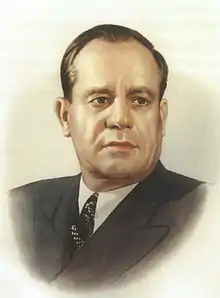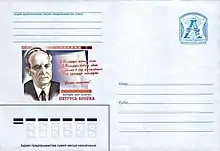Petrus Brovka
Pyotr Ustinovich Brovka (Belarusian: Пётр Усці́навіч Бро́ўка, romanized: Piotr Ustsinavich Brouka, Russian: Пётр Усти́нович Бро́вка; 25 June 1905 [O.S. 12 June] − 24 March 1980) was a Soviet Belarusian poet, more commonly recognized by his literary pseudonym Petrus Brovka (also transliterated from Belarusian as Piatrus Brovka or Pjatrus Broǔka).
Petrus Brovka | |
|---|---|
 | |
| Native name | Пятрус Броўка |
| Born | Piotr Ustsinavich Brouka 25 June 1905 Putilkovichi, Russian Empire (now Belarus) |
| Died | 24 March 1980 (aged 74) Minsk, Byelorussian SSR, Soviet Union (now Belarus) |
| Alma mater | Belarusian State University |
Biography
Brovka was born into a large and poor peasant family in Putilkovichi, a settlement in present-day Ushachy Raion, Vitebsk Region, on 25 June 1905. His first published works were printed in 1926, and the young poet briefly served as executive secretary of a local newspaper in 1927.[1] In 1928 he enrolled in the Literature-Linguistics Department of Belarusian State University, graduating in 1931.[1] Brovka joined the Communist Party of the Soviet Union in 1940.
During the Second World War, Brovka's mother was among the Belarusian people sent to Auschwitz by the occupying Nazi forces. Brovka himself wrote for the partisan press and published in the army newspapers, lauding the fighting effort of the Soviet people.[1] He was recognized by the Soviet government with the Stalin Prize in 1947, the same year that Brovka was elected chairman of the Writers' Union of the Byelorussian SSR (a position that he would hold until 1967).
Brovka reputation as a Soviet and Belarusian poet continued to grow during Brovka's subsequent decades in Minsk after the war. The fullest apex of his literary talents is considered to be his final decades in the 1960s and 1970s.[1]
Brovka was awarded the prestigious Lenin Prize after his completion of the poetry volume And Time Goes On in 1962.[2] In 1966, Brovka edited the first volume of the Byelorussian Soviet Encyclopedia, the year he was given the title of People's Poet of the Byelorussian Soviet Socialist Republic.[3] He was elected a full member of the Belarusian Academy of Sciences in 1966.
Apart from literary work, he served several terms as a representative of the Supreme Soviet of the Soviet Union, but maintained his literary career even as a political delegate. Some of his later verses made their way into Soviet pop music when they were adapted by the Belarusian Soviet folk rock band Pesniary.[1]
Brovka was awarded the title Hero of Socialist Labor in 1972.[4]
Minsk's Literary Museum of Petrus Brovka was established in his honor in 1980, when Brovka died at age 74.
In 2005, Belarus issued a postage stamp celebrating the hundredth anniversary of Pyotr Brovka's birth.[5]
Honours and awards

- Hero of Socialist Labour (1972)
- Order of Lenin (1949, 1965, 1972)
- Order of the October Revolution (1971)
- Order of the Red Star (1943)
- Order of Friendship of Peoples (1975)
- Order of the Badge of Honour (1939)
- Lenin Prize (1962) - a collection of poems "And the days go by ..." (1961)
- Stalin Prizes;
- 2nd class (1947) - for the poem "Bread" and "Thoughts about Moscow", the poem "The People's thanks", "Brother and Sister", "If I be", "Meeting"
- 3rd class (1951) - a collection of poems "The Road of Life"
- BSSR State Prizes;
- 1970 - a collection of poems, "Among the red mountain ashes"
- 1976 - for participation in the creation of the Belarusian Soviet Encyclopedia
- Yakub Kolas Literary prize (1957) - for the novel "When the merge of the river" (1957)
- People's Poet of the Byelorussian SSR (1966)
References
- "25 чэрвеня - 100 год з дня нараджэння П.У. Броўкі (1905-1980), народнага паэта Беларусі, грамадскага дзеяча" ("June 25 - 100 Years Since the Birth of P.U. Brovka (1905-1980), People's Poet of Belarus, Public Figure"). National Library of Belarus. 2005. Retrieved 9 July 2009. (in Belarusian)
- "Petrus Brovka". Fifty Soviet Poets. Ed. Ognev, Vladimir & Dorian Rottenberg. Moscow: Progress Publishers, 1969. ISBN 978-1-58963-604-0. P. 86.
- Stolyarchuk, Konstantin. "Первый энциклопедист" ("The First Encyclopedian"). Vecherniy Minsk 125 (11932), 27 June 2005. Retrieved 9 July 2009. (in Russian)
- Бровка Петрусь (Петр) Устинович (12 (25) VI 1905, с. Путилковичи Витебской обл. - 24 III 1980, Минск) - народный поэт Белоруссии, академик, общественный деятель" Archived 2008-06-16 at the Wayback Machine ("Brovka, Petrus (Pyotr) Ustinovich [12 (25) VI 1905, Putilkovichi Settlement of Vitebsk Voblast - 24 III 1980, Minsk] - People's Poet of Belarus, Academic, Public Figure"). Orenburg Bibliographical Encyclopedia. Orenburg.ru. Retrieved 9 July 2009. (in Russian)
- "100 лет со дня рождения Петруся Бровки" ("100 Years Since the Birth of Petrus Brovka"). Information pamphlet no. 17 (2007). BelPost. 17 June 2005. Retrieved 9 July 2009. (in Russian)